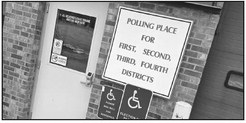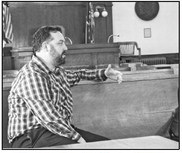Voting lists


While there are some people who have made outrage their default mental condition, the rest of us recognize that it is neither productive nor particularly healthy to keep that state of rage for long periods of time.
This does not diminish any individual’s passion for justice or desire to right the wrongs of the world, but that a pot can only be kept on boil for so long before all the water dries up.
Last winter, Wisconsin made headlines as the group Wisconsin Institute for Law & Liberty (WILL) sued the Wisconsin Election Commission arguing that nearly 300,000 registered voters should be removed from the voter roles because they did not return a piece of junk mail from the state asking if the voters had changed their address.
Going through the time and expense of doing a bulk mailing to ask people if they changed addresses seems odd to begin with. The chances of the postcards making their way to anyone who did move seems rather small. I say this as the person who once drove around with an overdue library book in my car for over a year despite passing the library two times a day.
It also seems ludicrous that the various government databases that record where people live can’t cross-update. For example, the Internal Revenue Service and the Wisconsin Department of Revenue seem to have no problem knowing where I live when it comes to tax time and they want to be paid.
It would seem that cross indexing voter roles to the addresses on taxes and Social Security would go a long way to keeping the system updated without a lot of extra labor.
Like many in the state, and around the country, I was outraged at WILL’s ham-handed attempt to disenfranchise voters just prior to the presidential preference primary. Analysis of the addresses showed people who moved from one apartment to another in the same building as being among those who would be purged from the voter lists.
American democracy depends on as many eligible voters going to the polls as possible. Putting up artificial barriers to people’s ability to vote is not only morally reprehensible but unAmerican as the most basic level not only to being a grievous insult to every service member who shed a drop of blood protecting that right.
The courts stepped in and gave those on the list a short reprieve, recognizing that many of the voters would be updating their registrations when they went to vote in the primary or in the spring election. For those in northern Wisconsin there was even another chance at the special election for the 7th Congressional District.
As was reported in state media this week, the list is down to about 129,000 people who haven’t gone online at https://myvote.wi.gov/ or checked with their local clerk to confirm they are registered and their information is correct.
I really want to work up a head of steam and feel outraged about the ongoing attempts to disenfranchise voters, but a nagging voice in my mind reminds me that voting is not only a right, it is a responsibility. Wisconsin makes registering to vote pretty easy, and this is a great thing. We don’t have to declare a party affiliation before we vote and can even register to vote at the polling places on election day.
While I still feel passionately that any barrier to voting is wrong, a nagging voice in my mind questions if people can’t be bothered to take the 10 seconds to confirm their registration status, are these people taking the time to be well-informed voters weighing all the issues?
The solution to the whole problem is for people to take the time before the August primaries and make sure their voter registration information is up to date and then actually show up on election day (or before with in-person absentee voting) and cast your ballot.
Brian Wilson is News Editor at The Star News.




